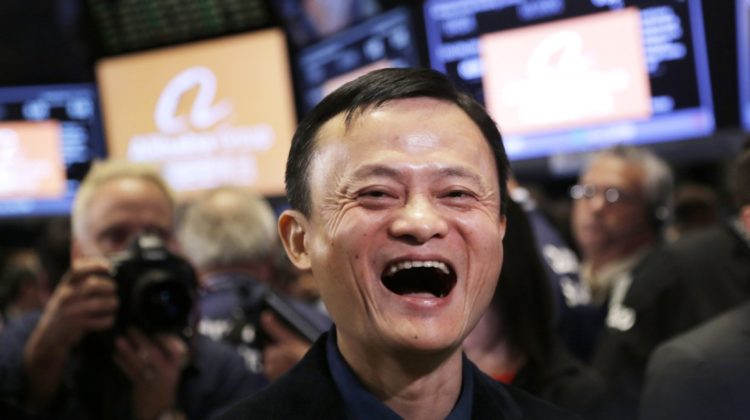

It was heralded as China’s answer to JPMorgan — a homegrown financial giant on the cusp of the biggest stock market debut the world has ever seen.
Instead, with billions on the line and an initial public offering all but sealed, Chinese authorities have abruptly thrown into doubt the future of Ant Group Co. and its celebrated founder, billionaire Jack Ma.
Only days before the financial technology juggernaut was to go public in Shanghai and Hong Kong — a coup for China’s financial markets that once would have been unimaginable — the $35-billion IPO was halted Tuesday after Ma, China’s richest man, was summoned by regulators. In an extraordinary turn of events, authorities announced that they had belatedly discovered an array of shortcomings that, by some accounts, might require the sprawling Ant to be overhauled.
The move upends what had been one of China’s biggest business success stories, as well as what was to be a pivotal step in the development of the nation’s fast-growing capital markets.
“It’s definitely surprising,” said Mike Bailey, director of research at FBB Capital Partners. “If there is something strange going on on the macro side for China’s financial markets or in the company, that would be worrisome.”
In just a decade, Ant, an affiliate of Ma’s Alibaba Group Holding Ltd., has exploded into the world’s largest financial technology company, reshaping the lives of many ordinary Chinese. But its ascendance — and Ma’s growing global reputation — has also raised a threat to China’s state-run lenders and their political benefactors.
Tuesday’s developments left bankers and global investors groping for answers. The immediate fate of the many billions already tied up in the IPO is for now uncertain. Reaction in the financial market was swift, with Alibaba’s U.S.-listed shares falling and futures on Hong Kong’s benchmark also declining.
Chinese authorities didn’t give much detail about the issues behind the suspension beyond saying that the much-anticipated debut couldn’t go ahead because there had been “significant change” in the regulatory environment.
The company will have to make changes that include capital increases at its lucrative micro-lending units, according to people familiar with the matter. It will also have to reapply for licenses for the units to operate nationwide, the people added, asking not to be identified discussing a private matter.
Ant, which spun out of Alibaba in 2010, has long been seen as a champion of China’s economy and an example of how the Communist Party has allowed entrepreneurs — especially in the technology sector — to flourish within its top-down political system. Tuesday’s setback may cast a pall over the country’s financial markets, even as President Xi Jinping tries to create stock exchanges that can rival those in the U.S.
“Ant Group sincerely apologizes to you for any inconvenience caused by this development,” the company said in a message to investors. “We will properly handle the follow-up matters in accordance with applicable regulations of the two stock exchanges.”
There were warning signs Monday, when Ma was summoned to a rare joint meeting with the People’s Bank of China and three other top financial regulators and was told his firm would face increased scrutiny and be subject to the same restrictions on capital and leverage similar to banks.
“This further reinforces the regulatory pressures building on tech giants,” said Nader Naeimi, head of dynamic markets at AMP Capital Investors Ltd. in Sydney, Australia. “It’s good news for banks, bad news for Jack Ma,” he said, referring to the competitive threat Ant poses for traditional lenders.
The company’s debut was expected for Thursday. Alibaba, which owns about a third of Ant and is listed in the U.S., tumbled 8.1% in trading Tuesday.
The IPO was on pace to break records. It had attracted at least $3 trillion of orders from individual investors for its dual listing in Hong Kong and Shanghai, and in the preliminary price consultation of its Shanghai IPO, institutional investors subscribed for more than 76 billion shares, more than 284 times the initial offering tranche.
The fintech company’s IPO would have given it a market value of about $315 billion based on filings, bigger than JPMorgan Chase & Co. and four times larger than Goldman Sachs Group Inc.
But Ant has faced scrutiny in Chinese state media in recent days after Ma criticized local and global regulators, accusing them of stifling innovation and not paying sufficient heed to development and opportunities for the young. At a Shanghai conference late last month, he compared the Basel Accords, which set out capital requirements for banks, to a club for the elderly.
And over the weekend, at a meeting of the Financial Stability and Development Committee led by Vice Premier Liu He, officials emphasized the need for fintech firms to be regulated.
Ant dominates China’s payments market via the Alipay app. It also runs the giant Yu’ebao money market fund and the country’s largest online consumer lending platform. Other businesses include a credit-scoring unit and an insurance marketplace.
Bloomberg writers Claire Ballentine, Peter Eichenbaum, Abhishek Vishnoi and Sofia Horta e Costa contributed to this report.
